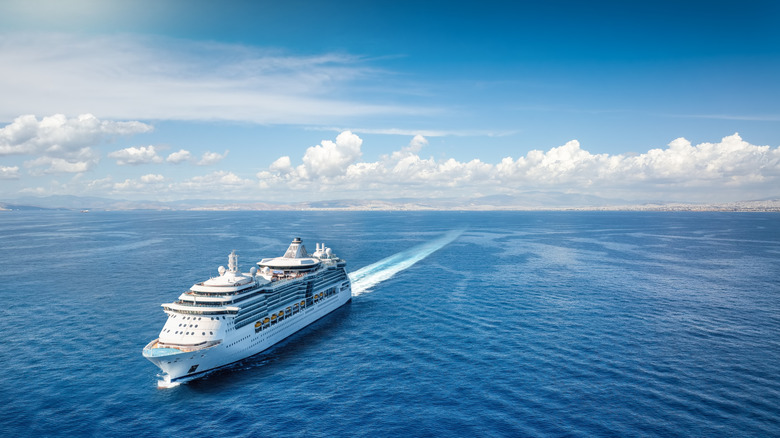What Happens When Cruise Passengers Die During Shore Excursions?
The unexpected death of an 80-year-old cruise ship passenger who reportedly died during an excursion to Australia's Lizard Island begs the question: What's the protocol when a passenger dies while on a cruise ship? Although deaths at sea during a cruise ship sailing are rare, averaging 200 per year, the fact is that people do pass away on cruises, and often due to unexpected circumstances. And as with every other aspect of a leisure cruise, there's a protocol in place to deal with such an unfortunate situation without causing undue stress to or anxiety among other passengers and members of the crew. While specifics may vary by cruise line, the process usually involves the participation of a specially trained care team to help the deceased's friends and family cope with the loss and logistics.
There's also the question of what to do with the body. Unless circumstances require it to be offloaded — a measure that could come into play in the event of suspicious death — most larger cruise lines, especially oceangoing vessels, operate ships with purpose-built onboard morgues capable of storing three to six bodies for up to a week. Things get more complicated when the death occurs during an extended sailing, especially tours with around-the-world cruise itineraries, which can include stops at less connected ports of call. In those cases, the deceased's body may remain on board until the ship reaches a major port with a transportation infrastructure capable of accommodating repatriation.
What happens next?
Which brings to fore the next hurdle — transporting the body home. Regulations vary by country, but repatriating the body from a larger port makes it easier to request assistance from the local consulate to help navigate logistics and applicable regulations. Having that kind of on-the-ground assistance is especially helpful in cases where the deceased died while traveling solo. That was the case in the recent death of Suzanne Rees. The New South Wales resident boarded Coral Expeditions' 120-passenger cruise ship Coral Adventurer in Cairns, Australia — one of 30 destinations where it's summer all the time — on October 24, 2025 to set sail on a 60-day luxury cruise around the continent. The following day, Rees joined an excursion to Lizard Island, a luxury island enclave located about 20 miles off the coast of Queensland.
Early reports are sketchy, but it appears Rees left the ship with the tour group on the morning of October 25 to take part in a guided hike to Cook's Look. The highest point on Lizard Island — a luxurious honeymoon trip that's worth the splurge — at 1,085 feet above sea level, Cook's Look offers spectacular views of the surrounding area, including off-shore coral reefs, but the 2.6-mile round-trip hike can be challenging. After she was discovered missing, fellow hikers reported Rees had decided to turn back before reaching the summit and assured everyone she would make her way back to the ship on her own. Unbeknownst to the staff and fellow passengers, Rees had not returned to the ship before it sailed for its next port of call.
Expect the best, but plan for the unthinkable
When Rees's absence came to light during a Saturday evening passenger check, the cruise ship returned to Lizard Island. Her body was found by search and rescue teams Sunday morning. While the Australian Maritime Safety Authority investigates the circumstances surrounding the incident, details of Rees's death and the recovery of her body have yet to be released, but local authorities have confirmed Rees's death was sudden and not suspicious. Tragic events like this incident bring to mind another key point to consider when planning a cruise. Although no one wants to think about dying during the trip of a lifetime, it does happen, and without a contingency plan in place, the deceased's family may be on the hook for a long list of unanticipated expenses.
We can't speak directly to the Rees family's circumstances, but in general, the deceased family is responsible for all of the costs related to repatriation. While cruise ship and consulate staff can help the family navigate the maze of paperwork and regulations that come into play when someone dies during a cruise, whether on board or on an excursion, the associated costs — and they add up quickly — fall squarely on the shoulders of the deceased's loved ones. That's why it's important to read the fine print in the contract and to pay careful attention to what is and is not covered by travel insurance, and to plan accordingly. It's also a good idea to become familiar with activities that may void travel insurance coverage.


